Business Law Assignment - Anti-Fraud and Compliance
VerifiedAdded on 2022/09/22
|12
|2611
|17
Homework Assignment
AI Summary
This Business Law assignment, prepared by a student, addresses compliance within a UK-based financial institution, focusing on new financial products and services. The assignment includes two main answers. The first answer defines the roles and responsibilities of the compliance function, emphasizing its importance in adhering to regulations, protecting investors, and reducing financial crime. It outlines the roles of compliance teams, directors, senior management, staff, and business units in ensuring compliance, and highlights the benefits of a robust compliance function in preventing fraud and maintaining market stability. The second answer provides guidance on improving anti-fraud systems within an international business, including recommendations for fraud prevention, detection, investigation, and recovery. It also proposes a comprehensive training plan to educate employees on anti-fraud measures, covering UK anti-bribery and anti-fraud laws, and methods for identifying and preventing fraudulent activities. The assignment references key concepts such as 'Know Your Customer' and 'Customer Due Diligence' policies, and the importance of training programs in mitigating risks. It also draws upon the International Advanced Certificate in Regulatory Compliance curriculum and related PwC reports.
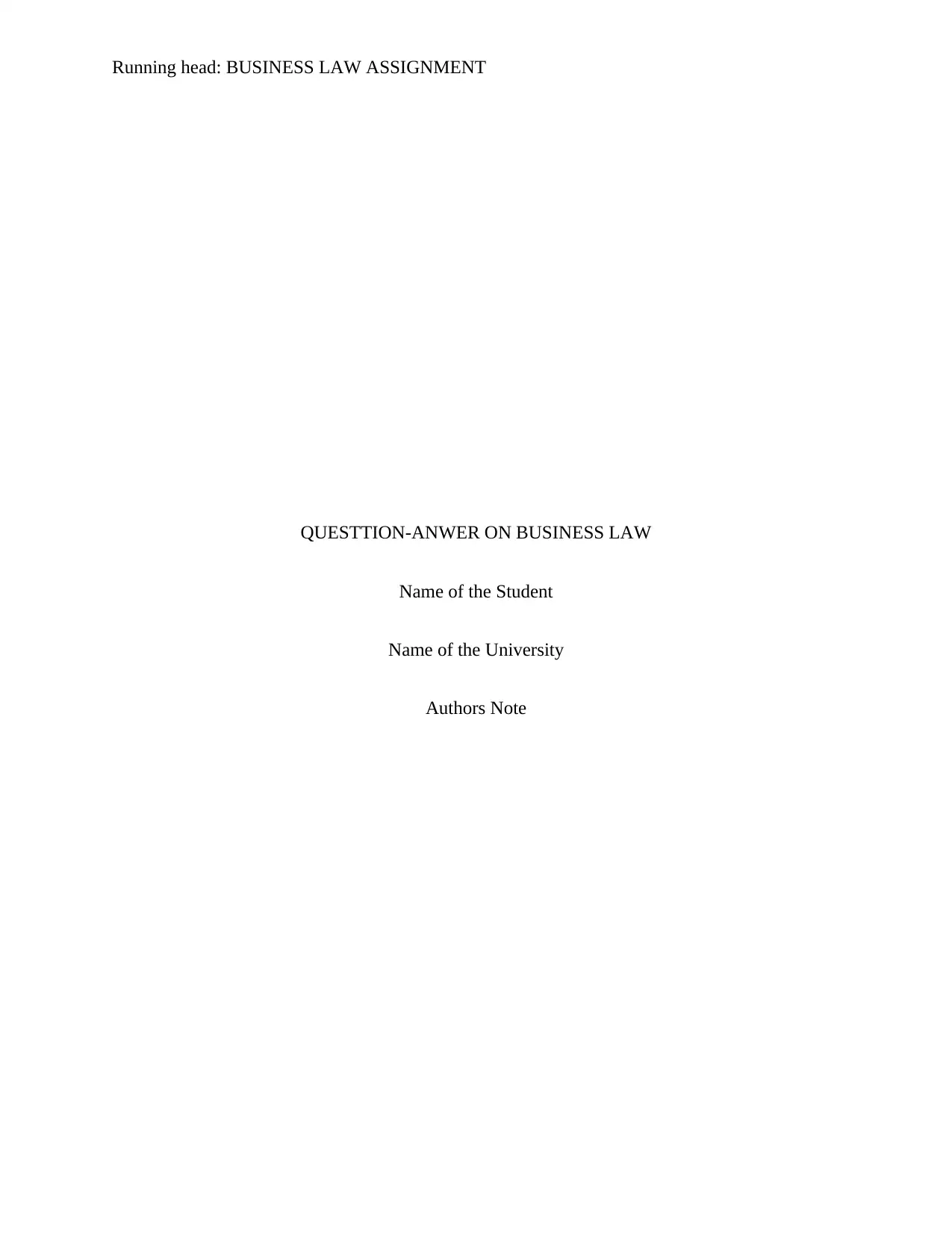
Running head: BUSINESS LAW ASSIGNMENT
QUESTTION-ANWER ON BUSINESS LAW
Name of the Student
Name of the University
Authors Note
QUESTTION-ANWER ON BUSINESS LAW
Name of the Student
Name of the University
Authors Note
Paraphrase This Document
Need a fresh take? Get an instant paraphrase of this document with our AI Paraphraser
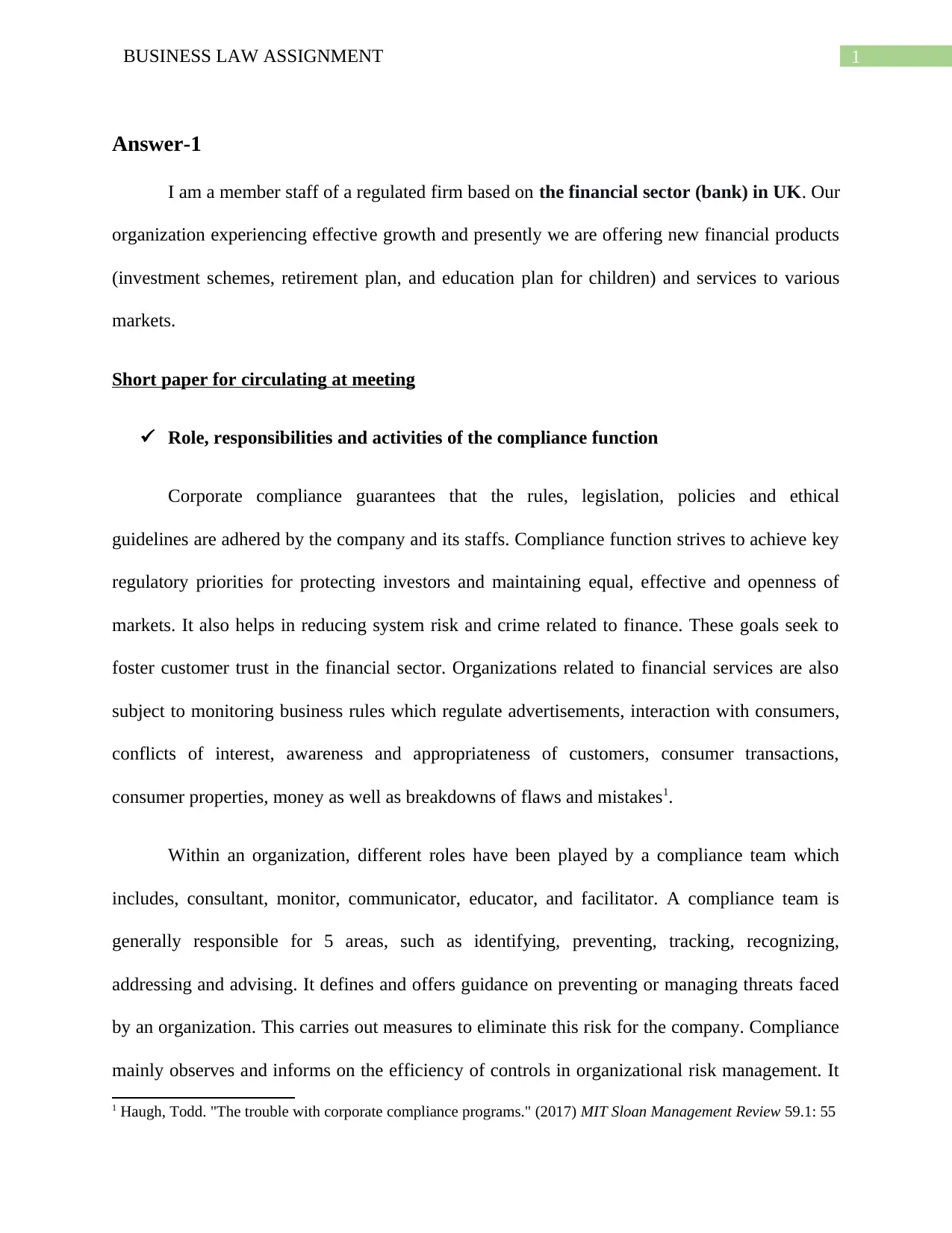
1BUSINESS LAW ASSIGNMENT
Answer-1
I am a member staff of a regulated firm based on the financial sector (bank) in UK. Our
organization experiencing effective growth and presently we are offering new financial products
(investment schemes, retirement plan, and education plan for children) and services to various
markets.
Short paper for circulating at meeting
Role, responsibilities and activities of the compliance function
Corporate compliance guarantees that the rules, legislation, policies and ethical
guidelines are adhered by the company and its staffs. Compliance function strives to achieve key
regulatory priorities for protecting investors and maintaining equal, effective and openness of
markets. It also helps in reducing system risk and crime related to finance. These goals seek to
foster customer trust in the financial sector. Organizations related to financial services are also
subject to monitoring business rules which regulate advertisements, interaction with consumers,
conflicts of interest, awareness and appropriateness of customers, consumer transactions,
consumer properties, money as well as breakdowns of flaws and mistakes1.
Within an organization, different roles have been played by a compliance team which
includes, consultant, monitor, communicator, educator, and facilitator. A compliance team is
generally responsible for 5 areas, such as identifying, preventing, tracking, recognizing,
addressing and advising. It defines and offers guidance on preventing or managing threats faced
by an organization. This carries out measures to eliminate this risk for the company. Compliance
mainly observes and informs on the efficiency of controls in organizational risk management. It
1 Haugh, Todd. "The trouble with corporate compliance programs." (2017) MIT Sloan Management Review 59.1: 55
Answer-1
I am a member staff of a regulated firm based on the financial sector (bank) in UK. Our
organization experiencing effective growth and presently we are offering new financial products
(investment schemes, retirement plan, and education plan for children) and services to various
markets.
Short paper for circulating at meeting
Role, responsibilities and activities of the compliance function
Corporate compliance guarantees that the rules, legislation, policies and ethical
guidelines are adhered by the company and its staffs. Compliance function strives to achieve key
regulatory priorities for protecting investors and maintaining equal, effective and openness of
markets. It also helps in reducing system risk and crime related to finance. These goals seek to
foster customer trust in the financial sector. Organizations related to financial services are also
subject to monitoring business rules which regulate advertisements, interaction with consumers,
conflicts of interest, awareness and appropriateness of customers, consumer transactions,
consumer properties, money as well as breakdowns of flaws and mistakes1.
Within an organization, different roles have been played by a compliance team which
includes, consultant, monitor, communicator, educator, and facilitator. A compliance team is
generally responsible for 5 areas, such as identifying, preventing, tracking, recognizing,
addressing and advising. It defines and offers guidance on preventing or managing threats faced
by an organization. This carries out measures to eliminate this risk for the company. Compliance
mainly observes and informs on the efficiency of controls in organizational risk management. It
1 Haugh, Todd. "The trouble with corporate compliance programs." (2017) MIT Sloan Management Review 59.1: 55
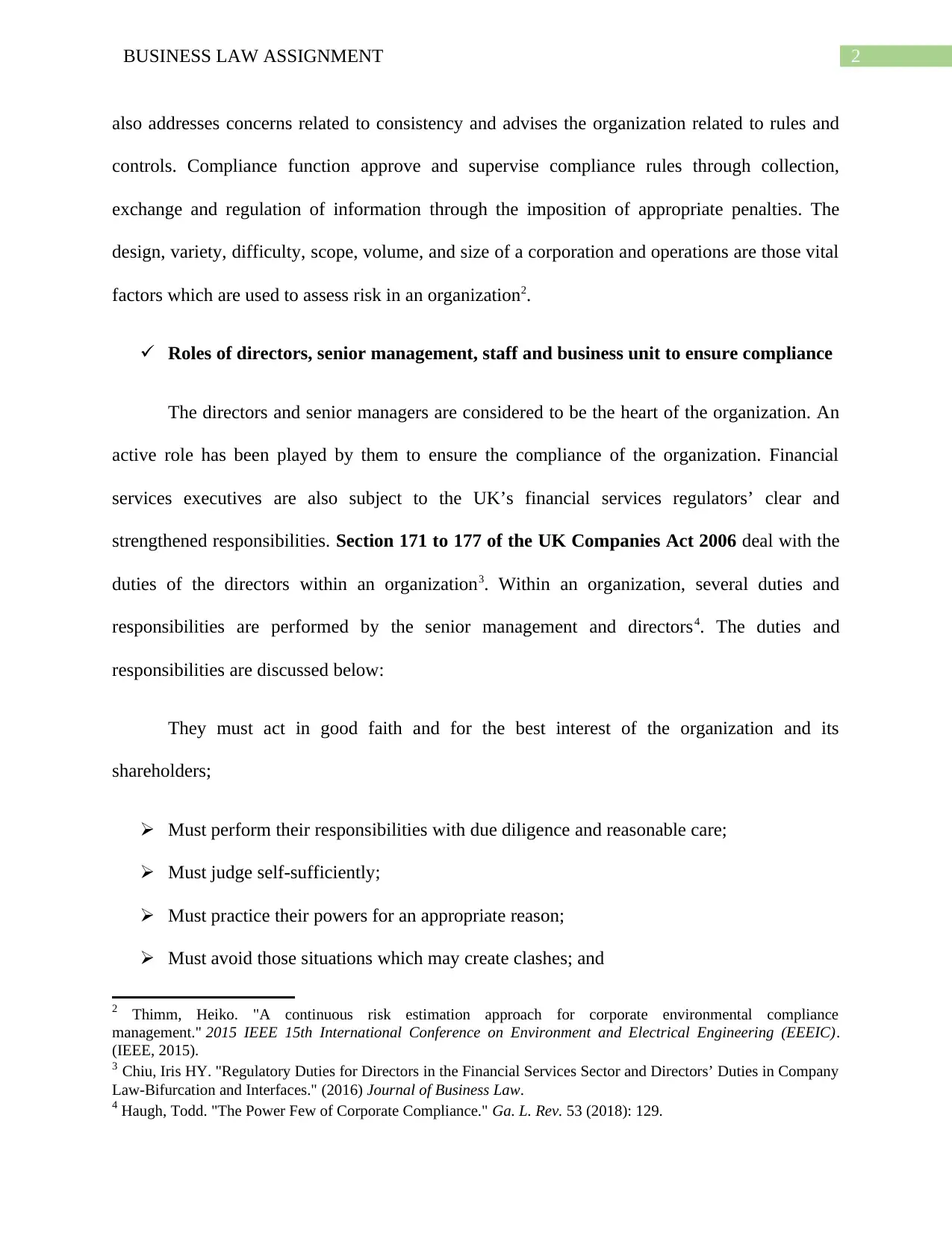
2BUSINESS LAW ASSIGNMENT
also addresses concerns related to consistency and advises the organization related to rules and
controls. Compliance function approve and supervise compliance rules through collection,
exchange and regulation of information through the imposition of appropriate penalties. The
design, variety, difficulty, scope, volume, and size of a corporation and operations are those vital
factors which are used to assess risk in an organization2.
Roles of directors, senior management, staff and business unit to ensure compliance
The directors and senior managers are considered to be the heart of the organization. An
active role has been played by them to ensure the compliance of the organization. Financial
services executives are also subject to the UK’s financial services regulators’ clear and
strengthened responsibilities. Section 171 to 177 of the UK Companies Act 2006 deal with the
duties of the directors within an organization3. Within an organization, several duties and
responsibilities are performed by the senior management and directors4. The duties and
responsibilities are discussed below:
They must act in good faith and for the best interest of the organization and its
shareholders;
Must perform their responsibilities with due diligence and reasonable care;
Must judge self-sufficiently;
Must practice their powers for an appropriate reason;
Must avoid those situations which may create clashes; and
2 Thimm, Heiko. "A continuous risk estimation approach for corporate environmental compliance
management." 2015 IEEE 15th International Conference on Environment and Electrical Engineering (EEEIC).
(IEEE, 2015).
3 Chiu, Iris HY. "Regulatory Duties for Directors in the Financial Services Sector and Directors’ Duties in Company
Law-Bifurcation and Interfaces." (2016) Journal of Business Law.
4 Haugh, Todd. "The Power Few of Corporate Compliance." Ga. L. Rev. 53 (2018): 129.
also addresses concerns related to consistency and advises the organization related to rules and
controls. Compliance function approve and supervise compliance rules through collection,
exchange and regulation of information through the imposition of appropriate penalties. The
design, variety, difficulty, scope, volume, and size of a corporation and operations are those vital
factors which are used to assess risk in an organization2.
Roles of directors, senior management, staff and business unit to ensure compliance
The directors and senior managers are considered to be the heart of the organization. An
active role has been played by them to ensure the compliance of the organization. Financial
services executives are also subject to the UK’s financial services regulators’ clear and
strengthened responsibilities. Section 171 to 177 of the UK Companies Act 2006 deal with the
duties of the directors within an organization3. Within an organization, several duties and
responsibilities are performed by the senior management and directors4. The duties and
responsibilities are discussed below:
They must act in good faith and for the best interest of the organization and its
shareholders;
Must perform their responsibilities with due diligence and reasonable care;
Must judge self-sufficiently;
Must practice their powers for an appropriate reason;
Must avoid those situations which may create clashes; and
2 Thimm, Heiko. "A continuous risk estimation approach for corporate environmental compliance
management." 2015 IEEE 15th International Conference on Environment and Electrical Engineering (EEEIC).
(IEEE, 2015).
3 Chiu, Iris HY. "Regulatory Duties for Directors in the Financial Services Sector and Directors’ Duties in Company
Law-Bifurcation and Interfaces." (2016) Journal of Business Law.
4 Haugh, Todd. "The Power Few of Corporate Compliance." Ga. L. Rev. 53 (2018): 129.
⊘ This is a preview!⊘
Do you want full access?
Subscribe today to unlock all pages.

Trusted by 1+ million students worldwide
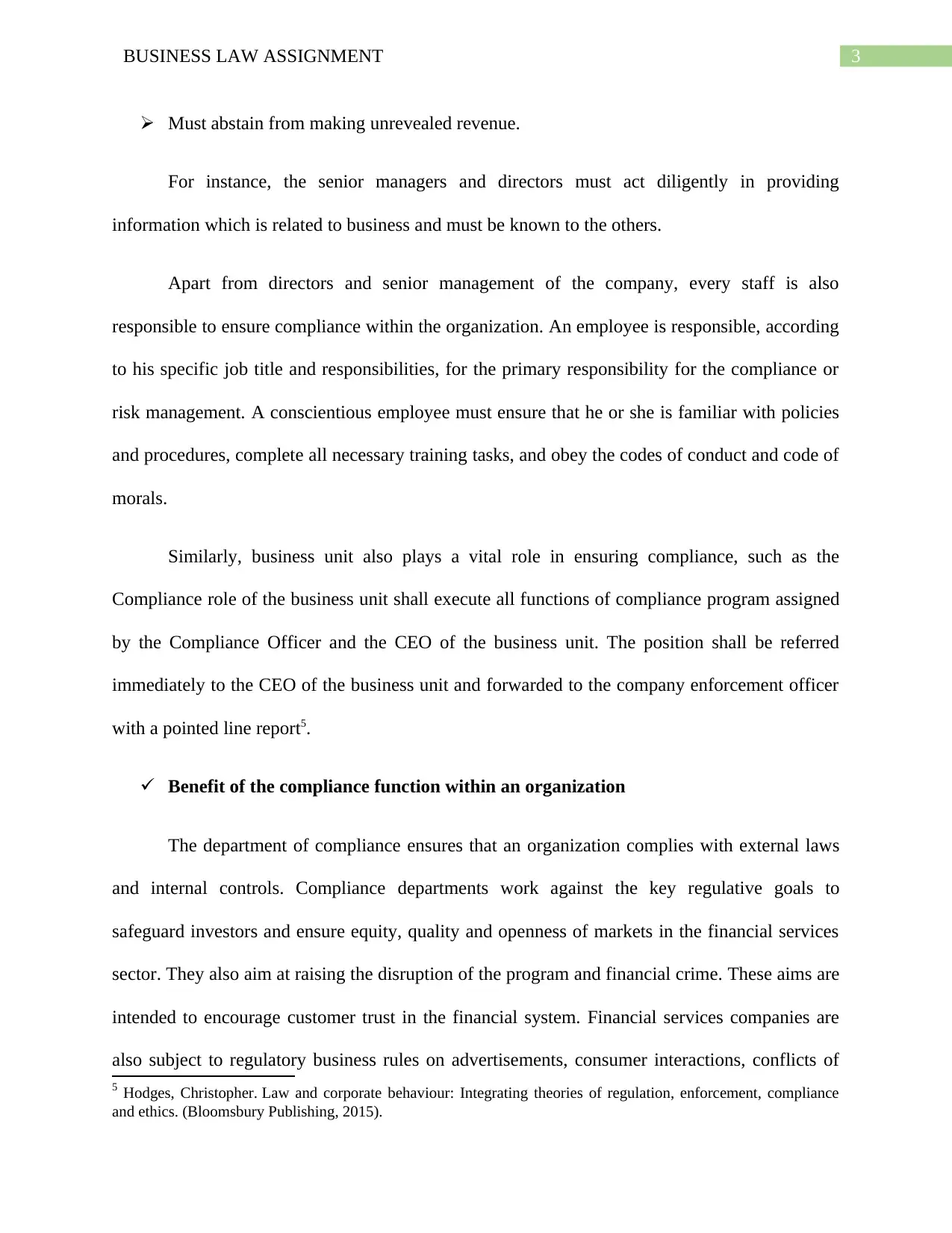
3BUSINESS LAW ASSIGNMENT
Must abstain from making unrevealed revenue.
For instance, the senior managers and directors must act diligently in providing
information which is related to business and must be known to the others.
Apart from directors and senior management of the company, every staff is also
responsible to ensure compliance within the organization. An employee is responsible, according
to his specific job title and responsibilities, for the primary responsibility for the compliance or
risk management. A conscientious employee must ensure that he or she is familiar with policies
and procedures, complete all necessary training tasks, and obey the codes of conduct and code of
morals.
Similarly, business unit also plays a vital role in ensuring compliance, such as the
Compliance role of the business unit shall execute all functions of compliance program assigned
by the Compliance Officer and the CEO of the business unit. The position shall be referred
immediately to the CEO of the business unit and forwarded to the company enforcement officer
with a pointed line report5.
Benefit of the compliance function within an organization
The department of compliance ensures that an organization complies with external laws
and internal controls. Compliance departments work against the key regulative goals to
safeguard investors and ensure equity, quality and openness of markets in the financial services
sector. They also aim at raising the disruption of the program and financial crime. These aims are
intended to encourage customer trust in the financial system. Financial services companies are
also subject to regulatory business rules on advertisements, consumer interactions, conflicts of
5 Hodges, Christopher. Law and corporate behaviour: Integrating theories of regulation, enforcement, compliance
and ethics. (Bloomsbury Publishing, 2015).
Must abstain from making unrevealed revenue.
For instance, the senior managers and directors must act diligently in providing
information which is related to business and must be known to the others.
Apart from directors and senior management of the company, every staff is also
responsible to ensure compliance within the organization. An employee is responsible, according
to his specific job title and responsibilities, for the primary responsibility for the compliance or
risk management. A conscientious employee must ensure that he or she is familiar with policies
and procedures, complete all necessary training tasks, and obey the codes of conduct and code of
morals.
Similarly, business unit also plays a vital role in ensuring compliance, such as the
Compliance role of the business unit shall execute all functions of compliance program assigned
by the Compliance Officer and the CEO of the business unit. The position shall be referred
immediately to the CEO of the business unit and forwarded to the company enforcement officer
with a pointed line report5.
Benefit of the compliance function within an organization
The department of compliance ensures that an organization complies with external laws
and internal controls. Compliance departments work against the key regulative goals to
safeguard investors and ensure equity, quality and openness of markets in the financial services
sector. They also aim at raising the disruption of the program and financial crime. These aims are
intended to encourage customer trust in the financial system. Financial services companies are
also subject to regulatory business rules on advertisements, consumer interactions, conflicts of
5 Hodges, Christopher. Law and corporate behaviour: Integrating theories of regulation, enforcement, compliance
and ethics. (Bloomsbury Publishing, 2015).
Paraphrase This Document
Need a fresh take? Get an instant paraphrase of this document with our AI Paraphraser
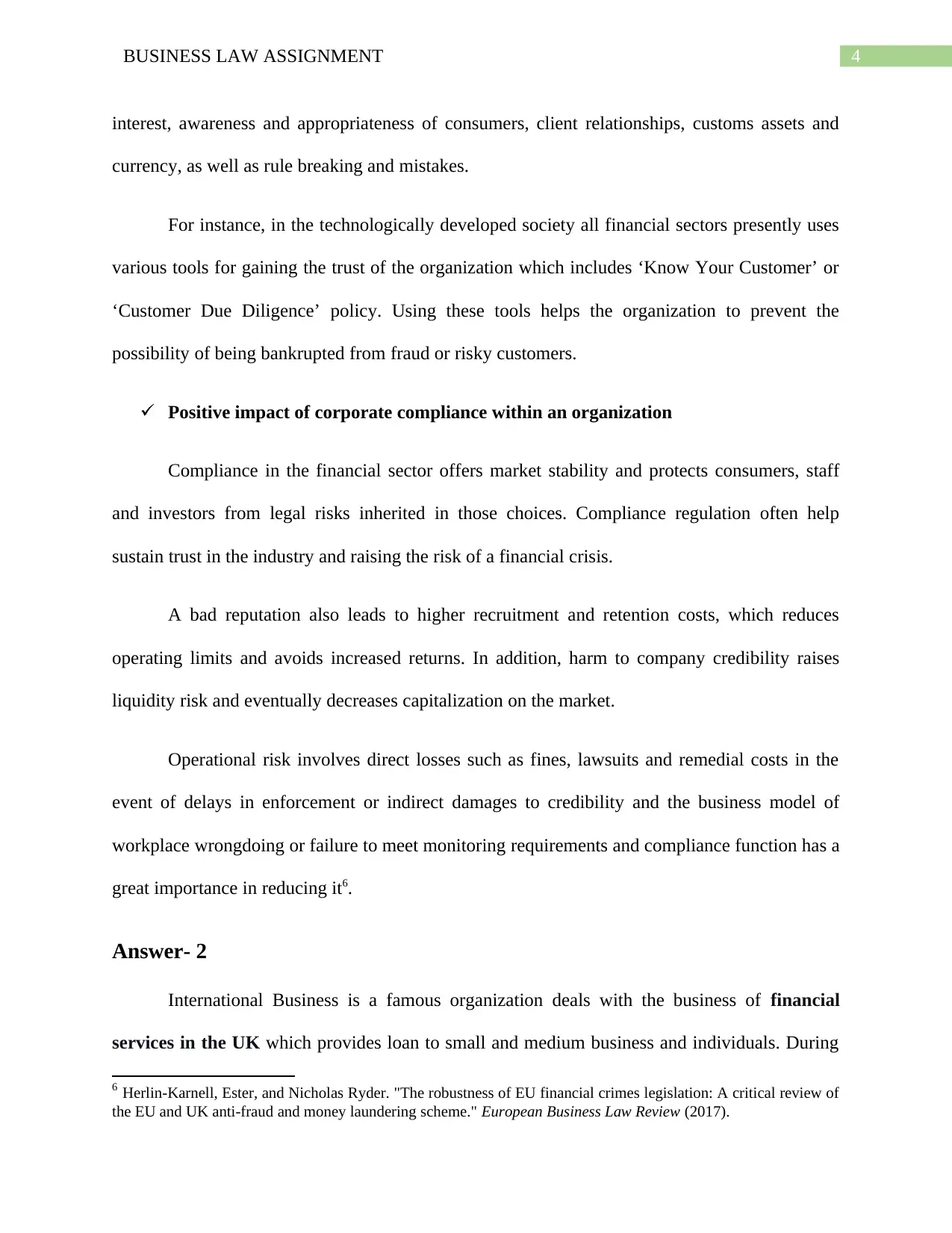
4BUSINESS LAW ASSIGNMENT
interest, awareness and appropriateness of consumers, client relationships, customs assets and
currency, as well as rule breaking and mistakes.
For instance, in the technologically developed society all financial sectors presently uses
various tools for gaining the trust of the organization which includes ‘Know Your Customer’ or
‘Customer Due Diligence’ policy. Using these tools helps the organization to prevent the
possibility of being bankrupted from fraud or risky customers.
Positive impact of corporate compliance within an organization
Compliance in the financial sector offers market stability and protects consumers, staff
and investors from legal risks inherited in those choices. Compliance regulation often help
sustain trust in the industry and raising the risk of a financial crisis.
A bad reputation also leads to higher recruitment and retention costs, which reduces
operating limits and avoids increased returns. In addition, harm to company credibility raises
liquidity risk and eventually decreases capitalization on the market.
Operational risk involves direct losses such as fines, lawsuits and remedial costs in the
event of delays in enforcement or indirect damages to credibility and the business model of
workplace wrongdoing or failure to meet monitoring requirements and compliance function has a
great importance in reducing it6.
Answer- 2
International Business is a famous organization deals with the business of financial
services in the UK which provides loan to small and medium business and individuals. During
6 Herlin-Karnell, Ester, and Nicholas Ryder. "The robustness of EU financial crimes legislation: A critical review of
the EU and UK anti-fraud and money laundering scheme." European Business Law Review (2017).
interest, awareness and appropriateness of consumers, client relationships, customs assets and
currency, as well as rule breaking and mistakes.
For instance, in the technologically developed society all financial sectors presently uses
various tools for gaining the trust of the organization which includes ‘Know Your Customer’ or
‘Customer Due Diligence’ policy. Using these tools helps the organization to prevent the
possibility of being bankrupted from fraud or risky customers.
Positive impact of corporate compliance within an organization
Compliance in the financial sector offers market stability and protects consumers, staff
and investors from legal risks inherited in those choices. Compliance regulation often help
sustain trust in the industry and raising the risk of a financial crisis.
A bad reputation also leads to higher recruitment and retention costs, which reduces
operating limits and avoids increased returns. In addition, harm to company credibility raises
liquidity risk and eventually decreases capitalization on the market.
Operational risk involves direct losses such as fines, lawsuits and remedial costs in the
event of delays in enforcement or indirect damages to credibility and the business model of
workplace wrongdoing or failure to meet monitoring requirements and compliance function has a
great importance in reducing it6.
Answer- 2
International Business is a famous organization deals with the business of financial
services in the UK which provides loan to small and medium business and individuals. During
6 Herlin-Karnell, Ester, and Nicholas Ryder. "The robustness of EU financial crimes legislation: A critical review of
the EU and UK anti-fraud and money laundering scheme." European Business Law Review (2017).
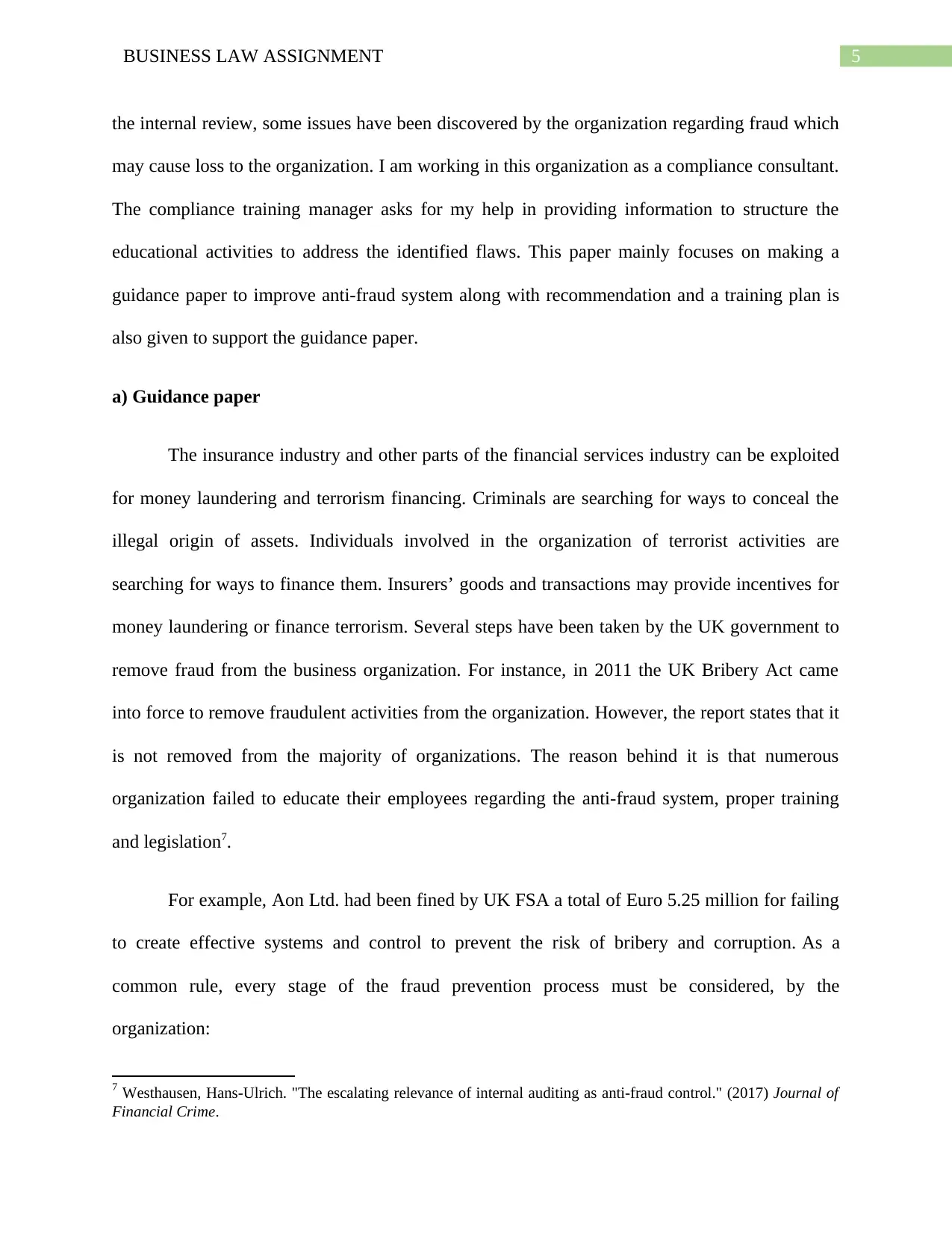
5BUSINESS LAW ASSIGNMENT
the internal review, some issues have been discovered by the organization regarding fraud which
may cause loss to the organization. I am working in this organization as a compliance consultant.
The compliance training manager asks for my help in providing information to structure the
educational activities to address the identified flaws. This paper mainly focuses on making a
guidance paper to improve anti-fraud system along with recommendation and a training plan is
also given to support the guidance paper.
a) Guidance paper
The insurance industry and other parts of the financial services industry can be exploited
for money laundering and terrorism financing. Criminals are searching for ways to conceal the
illegal origin of assets. Individuals involved in the organization of terrorist activities are
searching for ways to finance them. Insurers’ goods and transactions may provide incentives for
money laundering or finance terrorism. Several steps have been taken by the UK government to
remove fraud from the business organization. For instance, in 2011 the UK Bribery Act came
into force to remove fraudulent activities from the organization. However, the report states that it
is not removed from the majority of organizations. The reason behind it is that numerous
organization failed to educate their employees regarding the anti-fraud system, proper training
and legislation7.
For example, Aon Ltd. had been fined by UK FSA a total of Euro 5.25 million for failing
to create effective systems and control to prevent the risk of bribery and corruption. As a
common rule, every stage of the fraud prevention process must be considered, by the
organization:
7 Westhausen, Hans-Ulrich. "The escalating relevance of internal auditing as anti-fraud control." (2017) Journal of
Financial Crime.
the internal review, some issues have been discovered by the organization regarding fraud which
may cause loss to the organization. I am working in this organization as a compliance consultant.
The compliance training manager asks for my help in providing information to structure the
educational activities to address the identified flaws. This paper mainly focuses on making a
guidance paper to improve anti-fraud system along with recommendation and a training plan is
also given to support the guidance paper.
a) Guidance paper
The insurance industry and other parts of the financial services industry can be exploited
for money laundering and terrorism financing. Criminals are searching for ways to conceal the
illegal origin of assets. Individuals involved in the organization of terrorist activities are
searching for ways to finance them. Insurers’ goods and transactions may provide incentives for
money laundering or finance terrorism. Several steps have been taken by the UK government to
remove fraud from the business organization. For instance, in 2011 the UK Bribery Act came
into force to remove fraudulent activities from the organization. However, the report states that it
is not removed from the majority of organizations. The reason behind it is that numerous
organization failed to educate their employees regarding the anti-fraud system, proper training
and legislation7.
For example, Aon Ltd. had been fined by UK FSA a total of Euro 5.25 million for failing
to create effective systems and control to prevent the risk of bribery and corruption. As a
common rule, every stage of the fraud prevention process must be considered, by the
organization:
7 Westhausen, Hans-Ulrich. "The escalating relevance of internal auditing as anti-fraud control." (2017) Journal of
Financial Crime.
⊘ This is a preview!⊘
Do you want full access?
Subscribe today to unlock all pages.

Trusted by 1+ million students worldwide
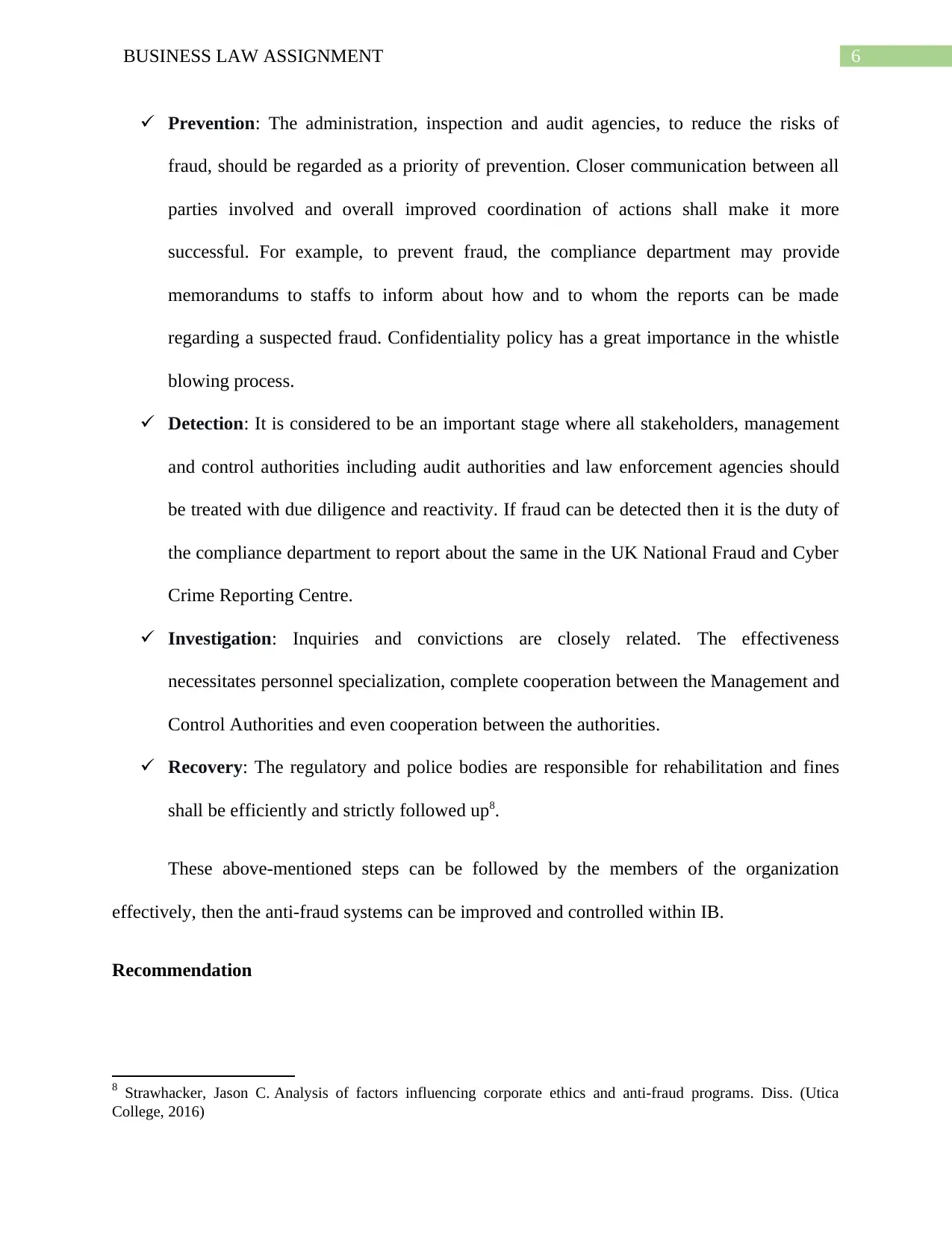
6BUSINESS LAW ASSIGNMENT
Prevention: The administration, inspection and audit agencies, to reduce the risks of
fraud, should be regarded as a priority of prevention. Closer communication between all
parties involved and overall improved coordination of actions shall make it more
successful. For example, to prevent fraud, the compliance department may provide
memorandums to staffs to inform about how and to whom the reports can be made
regarding a suspected fraud. Confidentiality policy has a great importance in the whistle
blowing process.
Detection: It is considered to be an important stage where all stakeholders, management
and control authorities including audit authorities and law enforcement agencies should
be treated with due diligence and reactivity. If fraud can be detected then it is the duty of
the compliance department to report about the same in the UK National Fraud and Cyber
Crime Reporting Centre.
Investigation: Inquiries and convictions are closely related. The effectiveness
necessitates personnel specialization, complete cooperation between the Management and
Control Authorities and even cooperation between the authorities.
Recovery: The regulatory and police bodies are responsible for rehabilitation and fines
shall be efficiently and strictly followed up8.
These above-mentioned steps can be followed by the members of the organization
effectively, then the anti-fraud systems can be improved and controlled within IB.
Recommendation
8 Strawhacker, Jason C. Analysis of factors influencing corporate ethics and anti-fraud programs. Diss. (Utica
College, 2016)
Prevention: The administration, inspection and audit agencies, to reduce the risks of
fraud, should be regarded as a priority of prevention. Closer communication between all
parties involved and overall improved coordination of actions shall make it more
successful. For example, to prevent fraud, the compliance department may provide
memorandums to staffs to inform about how and to whom the reports can be made
regarding a suspected fraud. Confidentiality policy has a great importance in the whistle
blowing process.
Detection: It is considered to be an important stage where all stakeholders, management
and control authorities including audit authorities and law enforcement agencies should
be treated with due diligence and reactivity. If fraud can be detected then it is the duty of
the compliance department to report about the same in the UK National Fraud and Cyber
Crime Reporting Centre.
Investigation: Inquiries and convictions are closely related. The effectiveness
necessitates personnel specialization, complete cooperation between the Management and
Control Authorities and even cooperation between the authorities.
Recovery: The regulatory and police bodies are responsible for rehabilitation and fines
shall be efficiently and strictly followed up8.
These above-mentioned steps can be followed by the members of the organization
effectively, then the anti-fraud systems can be improved and controlled within IB.
Recommendation
8 Strawhacker, Jason C. Analysis of factors influencing corporate ethics and anti-fraud programs. Diss. (Utica
College, 2016)
Paraphrase This Document
Need a fresh take? Get an instant paraphrase of this document with our AI Paraphraser
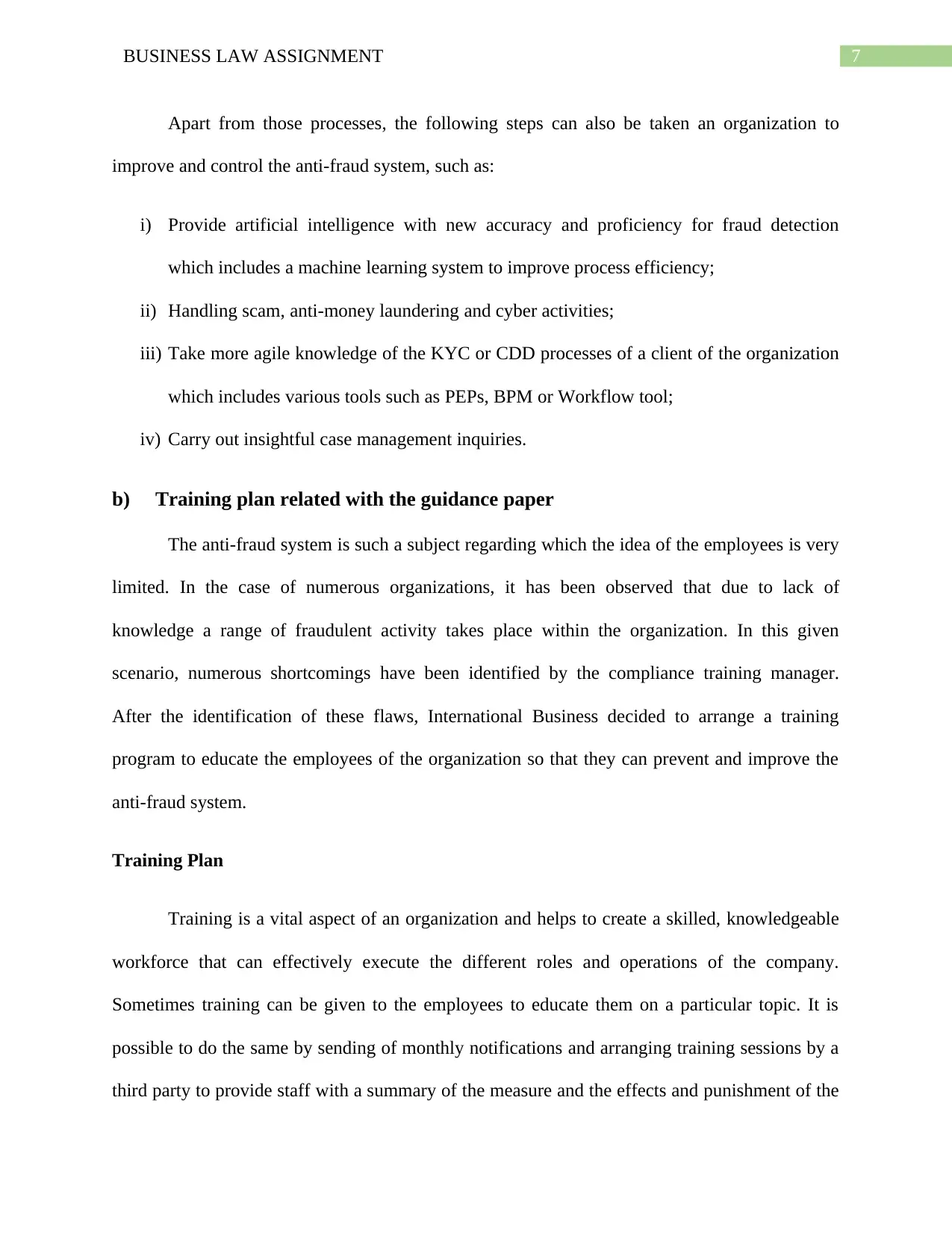
7BUSINESS LAW ASSIGNMENT
Apart from those processes, the following steps can also be taken an organization to
improve and control the anti-fraud system, such as:
i) Provide artificial intelligence with new accuracy and proficiency for fraud detection
which includes a machine learning system to improve process efficiency;
ii) Handling scam, anti-money laundering and cyber activities;
iii) Take more agile knowledge of the KYC or CDD processes of a client of the organization
which includes various tools such as PEPs, BPM or Workflow tool;
iv) Carry out insightful case management inquiries.
b) Training plan related with the guidance paper
The anti-fraud system is such a subject regarding which the idea of the employees is very
limited. In the case of numerous organizations, it has been observed that due to lack of
knowledge a range of fraudulent activity takes place within the organization. In this given
scenario, numerous shortcomings have been identified by the compliance training manager.
After the identification of these flaws, International Business decided to arrange a training
program to educate the employees of the organization so that they can prevent and improve the
anti-fraud system.
Training Plan
Training is a vital aspect of an organization and helps to create a skilled, knowledgeable
workforce that can effectively execute the different roles and operations of the company.
Sometimes training can be given to the employees to educate them on a particular topic. It is
possible to do the same by sending of monthly notifications and arranging training sessions by a
third party to provide staff with a summary of the measure and the effects and punishment of the
Apart from those processes, the following steps can also be taken an organization to
improve and control the anti-fraud system, such as:
i) Provide artificial intelligence with new accuracy and proficiency for fraud detection
which includes a machine learning system to improve process efficiency;
ii) Handling scam, anti-money laundering and cyber activities;
iii) Take more agile knowledge of the KYC or CDD processes of a client of the organization
which includes various tools such as PEPs, BPM or Workflow tool;
iv) Carry out insightful case management inquiries.
b) Training plan related with the guidance paper
The anti-fraud system is such a subject regarding which the idea of the employees is very
limited. In the case of numerous organizations, it has been observed that due to lack of
knowledge a range of fraudulent activity takes place within the organization. In this given
scenario, numerous shortcomings have been identified by the compliance training manager.
After the identification of these flaws, International Business decided to arrange a training
program to educate the employees of the organization so that they can prevent and improve the
anti-fraud system.
Training Plan
Training is a vital aspect of an organization and helps to create a skilled, knowledgeable
workforce that can effectively execute the different roles and operations of the company.
Sometimes training can be given to the employees to educate them on a particular topic. It is
possible to do the same by sending of monthly notifications and arranging training sessions by a
third party to provide staff with a summary of the measure and the effects and punishment of the
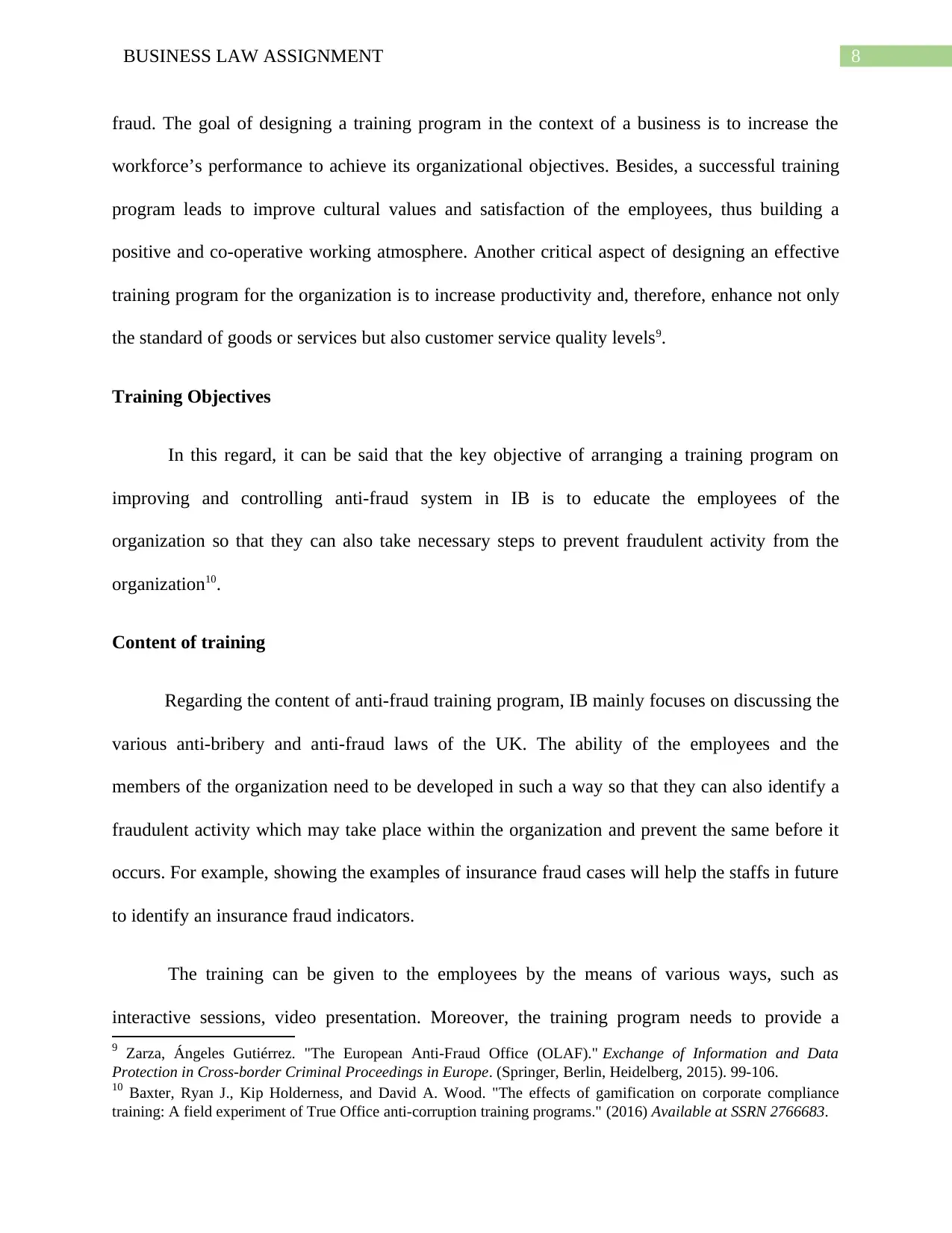
8BUSINESS LAW ASSIGNMENT
fraud. The goal of designing a training program in the context of a business is to increase the
workforce’s performance to achieve its organizational objectives. Besides, a successful training
program leads to improve cultural values and satisfaction of the employees, thus building a
positive and co-operative working atmosphere. Another critical aspect of designing an effective
training program for the organization is to increase productivity and, therefore, enhance not only
the standard of goods or services but also customer service quality levels9.
Training Objectives
In this regard, it can be said that the key objective of arranging a training program on
improving and controlling anti-fraud system in IB is to educate the employees of the
organization so that they can also take necessary steps to prevent fraudulent activity from the
organization10.
Content of training
Regarding the content of anti-fraud training program, IB mainly focuses on discussing the
various anti-bribery and anti-fraud laws of the UK. The ability of the employees and the
members of the organization need to be developed in such a way so that they can also identify a
fraudulent activity which may take place within the organization and prevent the same before it
occurs. For example, showing the examples of insurance fraud cases will help the staffs in future
to identify an insurance fraud indicators.
The training can be given to the employees by the means of various ways, such as
interactive sessions, video presentation. Moreover, the training program needs to provide a
9 Zarza, Ángeles Gutiérrez. "The European Anti-Fraud Office (OLAF)." Exchange of Information and Data
Protection in Cross-border Criminal Proceedings in Europe. (Springer, Berlin, Heidelberg, 2015). 99-106.
10 Baxter, Ryan J., Kip Holderness, and David A. Wood. "The effects of gamification on corporate compliance
training: A field experiment of True Office anti-corruption training programs." (2016) Available at SSRN 2766683.
fraud. The goal of designing a training program in the context of a business is to increase the
workforce’s performance to achieve its organizational objectives. Besides, a successful training
program leads to improve cultural values and satisfaction of the employees, thus building a
positive and co-operative working atmosphere. Another critical aspect of designing an effective
training program for the organization is to increase productivity and, therefore, enhance not only
the standard of goods or services but also customer service quality levels9.
Training Objectives
In this regard, it can be said that the key objective of arranging a training program on
improving and controlling anti-fraud system in IB is to educate the employees of the
organization so that they can also take necessary steps to prevent fraudulent activity from the
organization10.
Content of training
Regarding the content of anti-fraud training program, IB mainly focuses on discussing the
various anti-bribery and anti-fraud laws of the UK. The ability of the employees and the
members of the organization need to be developed in such a way so that they can also identify a
fraudulent activity which may take place within the organization and prevent the same before it
occurs. For example, showing the examples of insurance fraud cases will help the staffs in future
to identify an insurance fraud indicators.
The training can be given to the employees by the means of various ways, such as
interactive sessions, video presentation. Moreover, the training program needs to provide a
9 Zarza, Ángeles Gutiérrez. "The European Anti-Fraud Office (OLAF)." Exchange of Information and Data
Protection in Cross-border Criminal Proceedings in Europe. (Springer, Berlin, Heidelberg, 2015). 99-106.
10 Baxter, Ryan J., Kip Holderness, and David A. Wood. "The effects of gamification on corporate compliance
training: A field experiment of True Office anti-corruption training programs." (2016) Available at SSRN 2766683.
⊘ This is a preview!⊘
Do you want full access?
Subscribe today to unlock all pages.

Trusted by 1+ million students worldwide
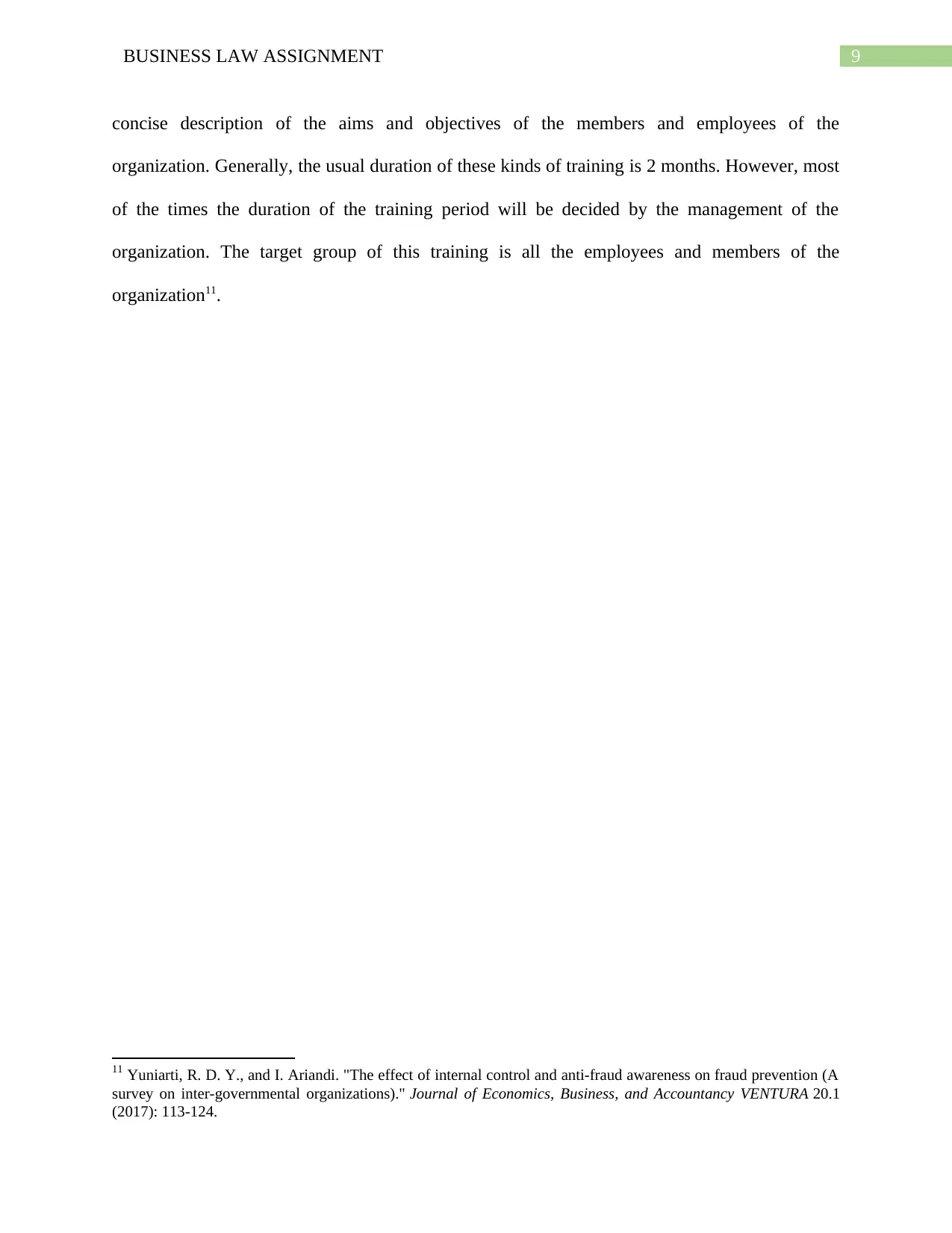
9BUSINESS LAW ASSIGNMENT
concise description of the aims and objectives of the members and employees of the
organization. Generally, the usual duration of these kinds of training is 2 months. However, most
of the times the duration of the training period will be decided by the management of the
organization. The target group of this training is all the employees and members of the
organization11.
11 Yuniarti, R. D. Y., and I. Ariandi. "The effect of internal control and anti-fraud awareness on fraud prevention (A
survey on inter-governmental organizations)." Journal of Economics, Business, and Accountancy VENTURA 20.1
(2017): 113-124.
concise description of the aims and objectives of the members and employees of the
organization. Generally, the usual duration of these kinds of training is 2 months. However, most
of the times the duration of the training period will be decided by the management of the
organization. The target group of this training is all the employees and members of the
organization11.
11 Yuniarti, R. D. Y., and I. Ariandi. "The effect of internal control and anti-fraud awareness on fraud prevention (A
survey on inter-governmental organizations)." Journal of Economics, Business, and Accountancy VENTURA 20.1
(2017): 113-124.
Paraphrase This Document
Need a fresh take? Get an instant paraphrase of this document with our AI Paraphraser
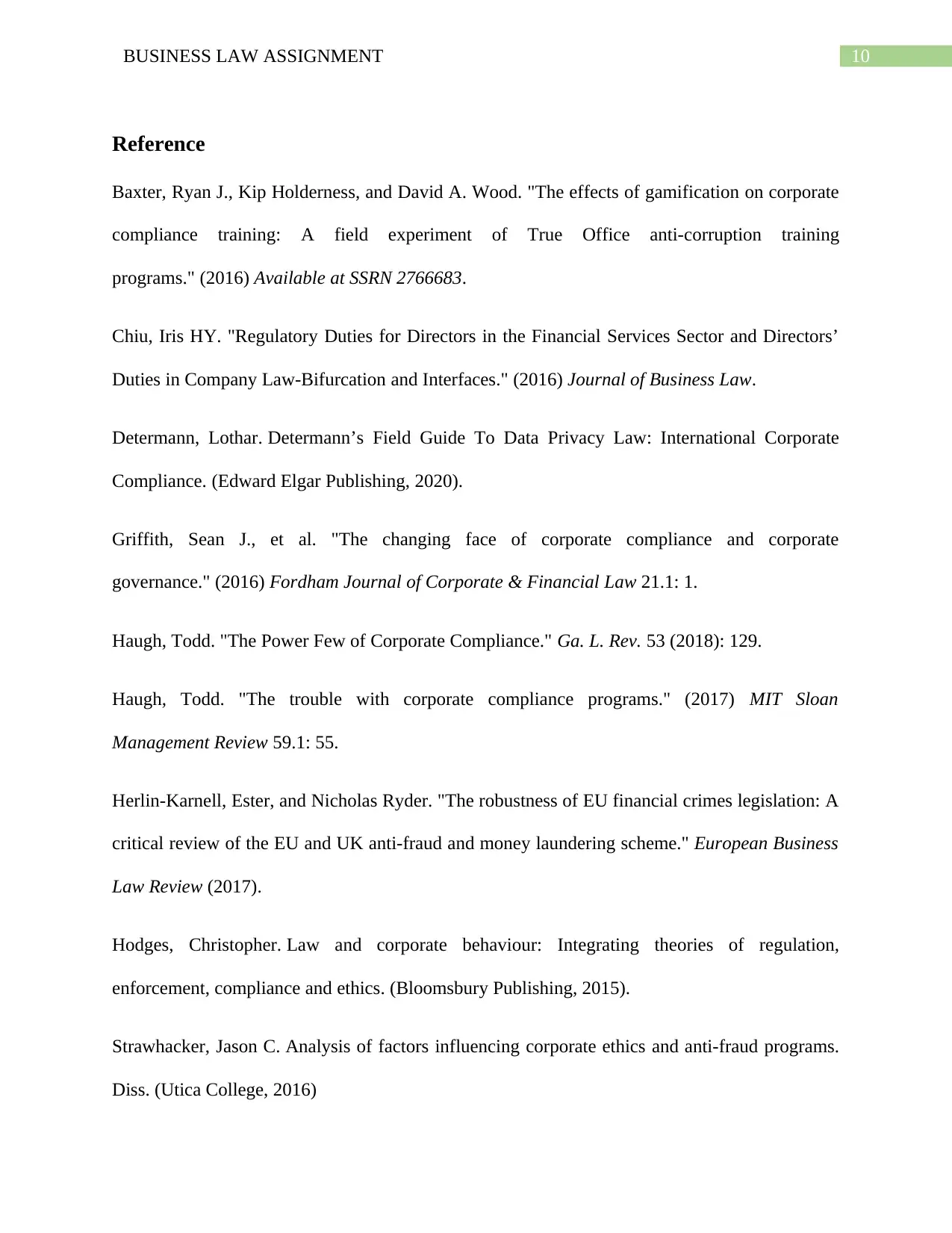
10BUSINESS LAW ASSIGNMENT
Reference
Baxter, Ryan J., Kip Holderness, and David A. Wood. "The effects of gamification on corporate
compliance training: A field experiment of True Office anti-corruption training
programs." (2016) Available at SSRN 2766683.
Chiu, Iris HY. "Regulatory Duties for Directors in the Financial Services Sector and Directors’
Duties in Company Law-Bifurcation and Interfaces." (2016) Journal of Business Law.
Determann, Lothar. Determann’s Field Guide To Data Privacy Law: International Corporate
Compliance. (Edward Elgar Publishing, 2020).
Griffith, Sean J., et al. "The changing face of corporate compliance and corporate
governance." (2016) Fordham Journal of Corporate & Financial Law 21.1: 1.
Haugh, Todd. "The Power Few of Corporate Compliance." Ga. L. Rev. 53 (2018): 129.
Haugh, Todd. "The trouble with corporate compliance programs." (2017) MIT Sloan
Management Review 59.1: 55.
Herlin-Karnell, Ester, and Nicholas Ryder. "The robustness of EU financial crimes legislation: A
critical review of the EU and UK anti-fraud and money laundering scheme." European Business
Law Review (2017).
Hodges, Christopher. Law and corporate behaviour: Integrating theories of regulation,
enforcement, compliance and ethics. (Bloomsbury Publishing, 2015).
Strawhacker, Jason C. Analysis of factors influencing corporate ethics and anti-fraud programs.
Diss. (Utica College, 2016)
Reference
Baxter, Ryan J., Kip Holderness, and David A. Wood. "The effects of gamification on corporate
compliance training: A field experiment of True Office anti-corruption training
programs." (2016) Available at SSRN 2766683.
Chiu, Iris HY. "Regulatory Duties for Directors in the Financial Services Sector and Directors’
Duties in Company Law-Bifurcation and Interfaces." (2016) Journal of Business Law.
Determann, Lothar. Determann’s Field Guide To Data Privacy Law: International Corporate
Compliance. (Edward Elgar Publishing, 2020).
Griffith, Sean J., et al. "The changing face of corporate compliance and corporate
governance." (2016) Fordham Journal of Corporate & Financial Law 21.1: 1.
Haugh, Todd. "The Power Few of Corporate Compliance." Ga. L. Rev. 53 (2018): 129.
Haugh, Todd. "The trouble with corporate compliance programs." (2017) MIT Sloan
Management Review 59.1: 55.
Herlin-Karnell, Ester, and Nicholas Ryder. "The robustness of EU financial crimes legislation: A
critical review of the EU and UK anti-fraud and money laundering scheme." European Business
Law Review (2017).
Hodges, Christopher. Law and corporate behaviour: Integrating theories of regulation,
enforcement, compliance and ethics. (Bloomsbury Publishing, 2015).
Strawhacker, Jason C. Analysis of factors influencing corporate ethics and anti-fraud programs.
Diss. (Utica College, 2016)
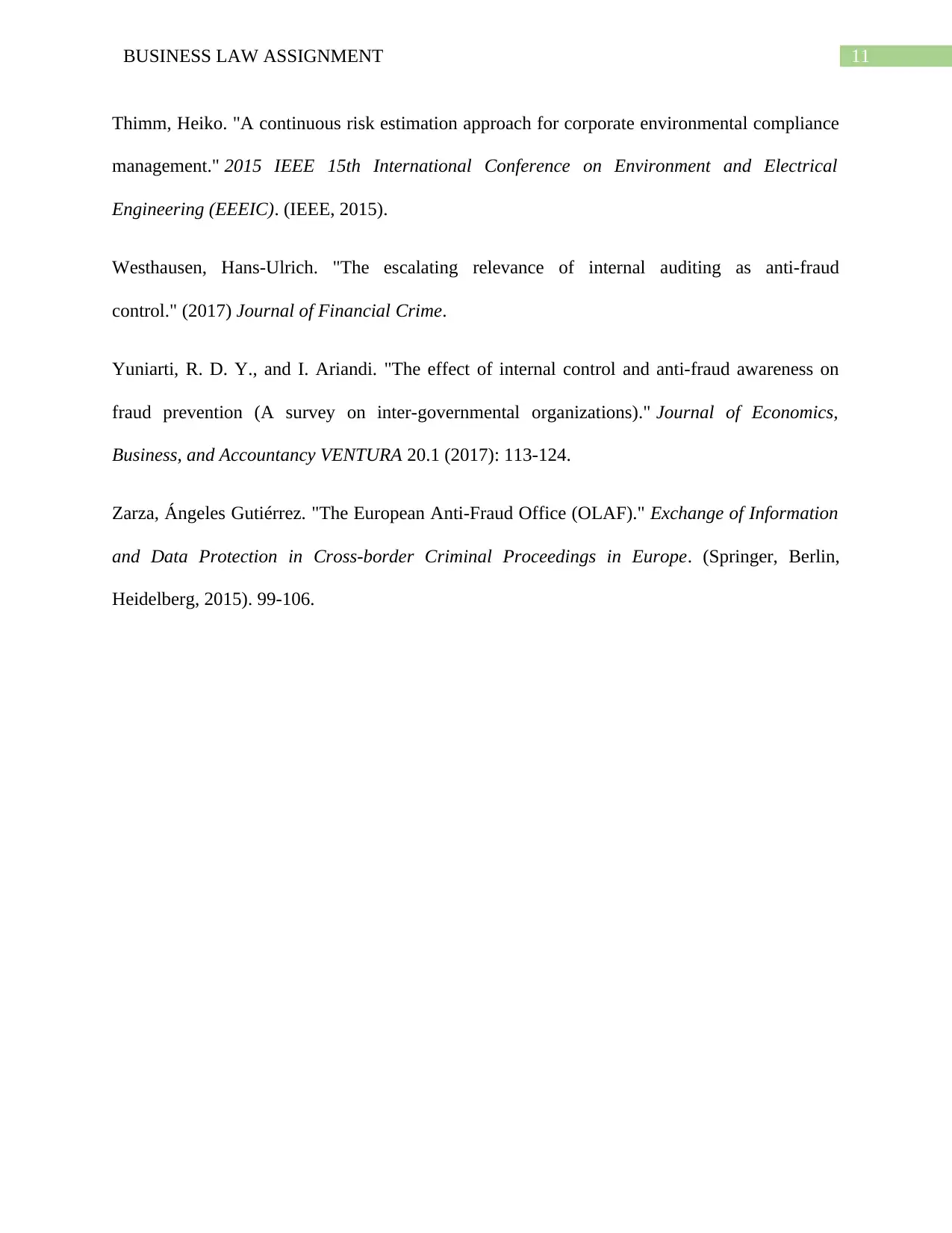
11BUSINESS LAW ASSIGNMENT
Thimm, Heiko. "A continuous risk estimation approach for corporate environmental compliance
management." 2015 IEEE 15th International Conference on Environment and Electrical
Engineering (EEEIC). (IEEE, 2015).
Westhausen, Hans-Ulrich. "The escalating relevance of internal auditing as anti-fraud
control." (2017) Journal of Financial Crime.
Yuniarti, R. D. Y., and I. Ariandi. "The effect of internal control and anti-fraud awareness on
fraud prevention (A survey on inter-governmental organizations)." Journal of Economics,
Business, and Accountancy VENTURA 20.1 (2017): 113-124.
Zarza, Ángeles Gutiérrez. "The European Anti-Fraud Office (OLAF)." Exchange of Information
and Data Protection in Cross-border Criminal Proceedings in Europe. (Springer, Berlin,
Heidelberg, 2015). 99-106.
Thimm, Heiko. "A continuous risk estimation approach for corporate environmental compliance
management." 2015 IEEE 15th International Conference on Environment and Electrical
Engineering (EEEIC). (IEEE, 2015).
Westhausen, Hans-Ulrich. "The escalating relevance of internal auditing as anti-fraud
control." (2017) Journal of Financial Crime.
Yuniarti, R. D. Y., and I. Ariandi. "The effect of internal control and anti-fraud awareness on
fraud prevention (A survey on inter-governmental organizations)." Journal of Economics,
Business, and Accountancy VENTURA 20.1 (2017): 113-124.
Zarza, Ángeles Gutiérrez. "The European Anti-Fraud Office (OLAF)." Exchange of Information
and Data Protection in Cross-border Criminal Proceedings in Europe. (Springer, Berlin,
Heidelberg, 2015). 99-106.
⊘ This is a preview!⊘
Do you want full access?
Subscribe today to unlock all pages.

Trusted by 1+ million students worldwide
1 out of 12
Related Documents
Your All-in-One AI-Powered Toolkit for Academic Success.
+13062052269
info@desklib.com
Available 24*7 on WhatsApp / Email
![[object Object]](/_next/static/media/star-bottom.7253800d.svg)
Unlock your academic potential
Copyright © 2020–2026 A2Z Services. All Rights Reserved. Developed and managed by ZUCOL.





